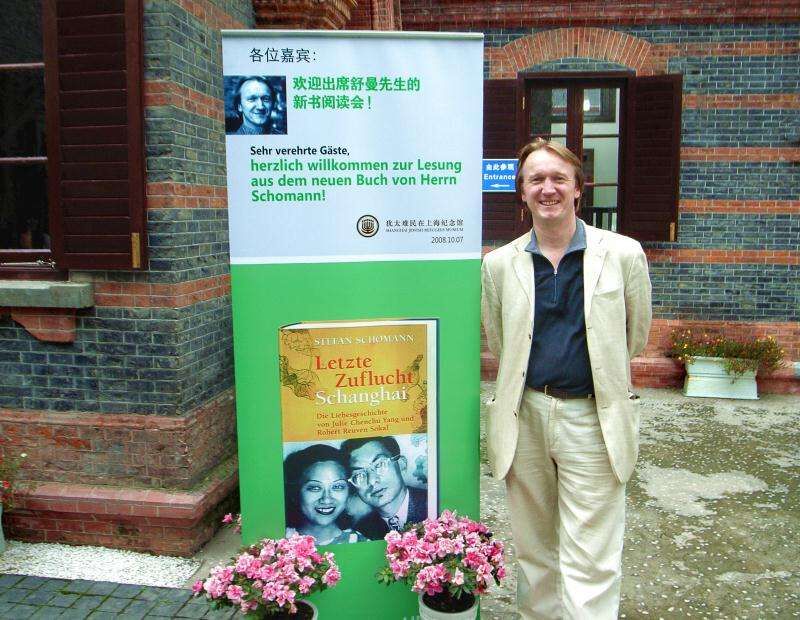Feature: Discovering soul-touching stories in China - a German writer's perspective

Stefan Schomann takes a photo with a poster of the publicity event for his book Last Refuge in Shanghai at the Shanghai Jewish Refugee Museum in Shanghai on September 10, 2010. (Photo provided by Stefan Schomann )
by Xinhua writers He Fei, Ma Qian, Deng Xianlai
BEIJING, Oct. 15 (Xinhua) -- With its long history, China has always been a treasure trove of soul-touching sagas of epic proportions. The intercultural love story of a Jewish young man and a Chinese woman in war-torn Shanghai during World War II is one of them.
It was discovered by German writer and freelance journalist Stefan Schomann and became the subject of his book "Last Refuge in Shanghai". Schomann calls it "a crazy story that happened in a crazy time" in an "exotic location."
CROSS-BORDER LOVERS DURING WWII
In 1939, when Nazi Germany annexed Austria, Robert Reuven Sokal fled his country with his family, joining the band of less than 20,000 Jews who embarked on an odyssey from central and eastern Europe to the foreign concessions in Shanghai, one of the few places that didn't require Jewish refugees seeking sanctuary to have a visa.
In Shanghai, while studying at St. John's University, Sokal, the son of a Viennese paint factory owner, met Julie Chenchu Yang, who was born in a wealthy Chinese family. By then, Shanghai was experiencing the pain of Japanese invasion and Shanghai's Chinese and Jewish communities shared a common sorrow.
"I was looking for a story that tells more than just this epic story of Jewish immigration to China, to Shanghai. I wanted to tell how China experienced the war ... what happened in China," Schomann said.
To combine a Euro-centric perspective with a Chinese one, which is rarely seen in earlier books on the Jewish community in Shanghai, Schomann talked to the Chinese neighbors of the refugees aside from Jewish survivors.
Since very few people know what really happened in Shanghai in 1937, he thinks "Last Refuge in Shanghai" may serve to fill in gaps in history. "It was ... important to me to tell this (story)," he explained.
The young lovers supported each other through countless challenges, including turmoil and the cruelty of war, opposition from Yang's family, and other obstacles in their intercultural marriage, eventually embracing a happy ending.
WRITING ABOUT CHINA
Born in 1962, Schomann, a student of German literature, has been a frequent visitor to China for almost 20 years. He has been writing articles based in China for leading German media outlets, and has published four books on China in German and Chinese.
Schomann began to write in both languages inspired by Lin Yutang, the Chinese author who lived between 1895 and 1976 and wrote in a polished style in both Chinese and English. The German author said it was Lin who introduced China to him to a degree.
"It was absolutely fascinating to encounter such a bright mind from China, who was writing with such (ease)," he said.
Schomann called Lin a fascinating writer, philosopher, thinker and cultural activist, saying, "His books have a lot to (contribute) for a better understanding of Chinese culture and history, and Chinese mentality."
Yet, understanding China is not an easy task for a Westerner. "I think it's impossible to perceive (China) as a whole, or to judge (it) as a whole, or to make statements about (it) as a whole. It will just lead to strong simplifications and generalizations," he said.
He compared forming an image of China to piecing together mosaics: "The big image is composed of many little images -- pieces of the mosaic. And you are always working on one piece."
This perspective is best illustrated in his new book released in June, "China -- Strolls Through an Empire," which features 10 individual travel stories covering trips to a diversity of Chinese landscapes, from wild deserts in the northwest to modern cities in the coastal east, as well as landlocked cities with ancient history and precious cultural heritages.
Schomann cited an article in the book to illustrate the concept of mosaic. He wrote about the two-day annual traditional storytelling festival in north China's Henan Province, where "the whole universe of Chinese culture, mentality and entertainment" was present and he tried to present "the essence of this culture" in a 2500-word narrative.
"As a journalist you take something quite limited, but then you open up a whole world within this topic," he said.
OBSERVING CHINA AS STORYTELLER
Schomann deems himself to be a peer of Chinese storytellers, one who, by using a different medium, shares his experiences, thinking, and observations over the years "to create a comparatively easy access to China." he calls it a personal access.
"People are intimidated by China. It's such a big country and such a complex subject," he said, explaining how the language with its system of characters instead of an alphabet, is alien to Westerners. And that is just one factor.
His aim is to help readers "overcome this intimidation of China basically by telling people that you don't have to understand everything, just to make the first step, and the second, and the third, then you will be able to get somewhere."
To create a real-life impression of China on people, Schomann resorts to other things besides writing. While researching the Shanghai refugees, he came across some historical footage taken by German photographer Eugen Flegler (1897-1981).
Flegler went on excursions to take photos of the countryside and the peasants in and beyond Shanghai from 1936 to 1938. Very few people took pictures of China's rural areas in those years.
Schomann curated an exhibition with these historical images. The exhibition was held eight times in Germany and China.
Covering China for years, Schomann has his own understanding of the Chinese Dream. He describes it as China "becoming a well-respected member of the global community, and to increase China's importance and significance on an international level."
Within two decades, China has made great progress towards that aim, he said. "China became more international, more cosmopolitan, more respected on (the) international stage."
Jiang Weirui in Beijing, and Yang Zhen and Jiang Liyuan in Shanghai also contributed to the report.















